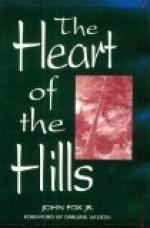In Gray’s home it had gone on unchecked toward the same tragedy, but in Marjorie’s the thrifty, quiet force of her mother’s hand had been in power, and in the little girl the same force was plain. Her father was a Pendleton of the Pendletons, too, but the same gentle force had, without curb or check-rein, so guided him that while he lived he led proudly with never a suspicion that he was being led. And since the death of Gray’s mother and Marjorie’s father each that was left had been faithful to the partner gone, and in spite of prediction and gossip, the common neighborhood prophecy had remained unfulfilled.
A mile farther onward, the face of the land on each side changed suddenly and sharply and became park-like. Not a ploughed acre was visible, no tree-top was shattered, no broken boughs hung down. The worm fence disappeared and neat white lines flashed divisions of pastures, it seemed, for miles. A great amphitheatrical red barn sat on every little hill or a great red rectangular tobacco barn. A huge dairy was building of brick. Paddocks and stables were everywhere, macadamized roads ran from the main highway through the fields, and on the highest hill visible stood a great villa—a colossal architectural stranger in the land—and Burnham was driving by a row of neat red cottages, strangers, too, in the land. In the old Stonewall neighborhood that Burnham had left the gradual depopulation around old Hiram left him almost as alone as his pioneer grandfather had been, and the home of the small farmers about him had been filled by the tobacco tenant. From the big villa emanated a similar force with a similar tendency, but old Hiram, compared with old Morton Sanders, was as a slow fire to a lightning-bolt. Sanders was from the East, had unlimited wealth, and loved race-horses. Purchasing a farm for them, the Saxon virus in his Kentucky blood for land had gotten hold of him, and he, too, had started depopulating the country; only where old Hiram bought roods, he bought acres; and where Hiram bagged the small farmer for game, Sanders gunned for the aristocrat as well. It was for Sanders that Colonel Pendleton had gone to the mountains long ago to gobble coal lands. It was to him that the roof over little Jason’s head and the earth under his feet had been sold, and the school-master smiled a little bitterly when he turned at last into a gate and drove toward a stately old home in the midst of ancient cedars, for he was thinking of the little mountaineer and of the letter St. Hilda had sent him years ago.




